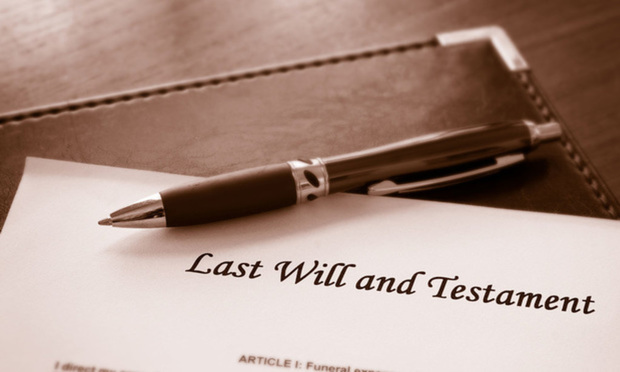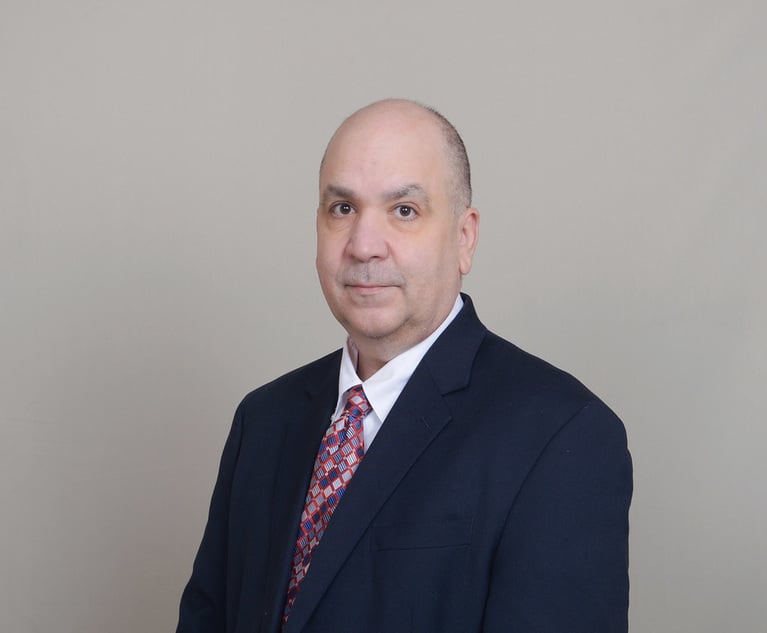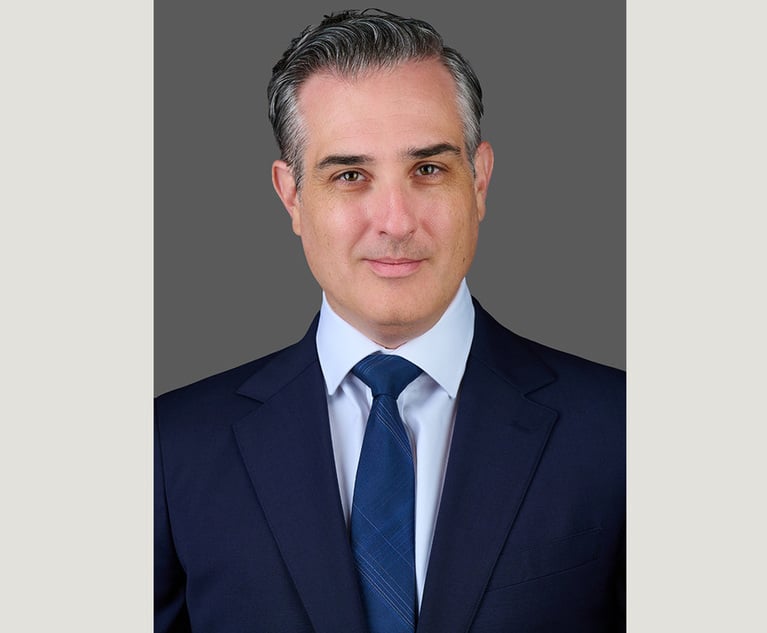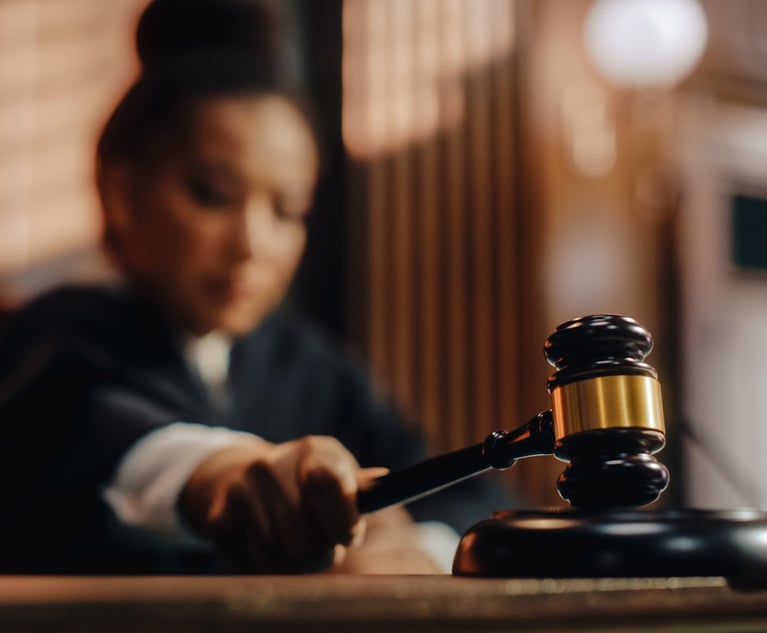Appeals Court Sides With Saul Ewing in Legal Mal Case Over Unexecuted Trust
The plaintiffs brought breach of contract and legal malpractice claims against Saul Ewing partner Robert Louis and the firm, which had represented plaintiff Brinton Young's uncle, Philip Young, in trust and estate matters.
January 10, 2019 at 11:53 AM
5 minute read
 Credit: zimmytws/Shutterstock.com
Credit: zimmytws/Shutterstock.com
The Superior Court has upheld a Philadelphia trial judge's ruling that Saul Ewing Arnstein & Lehr and one of its partners cannot be sued for allegedly failing to ensure that a former client executed an amendment to his trust before he died.
In Estate of Philip F. Young v. Louis, the plaintiffs brought breach of contract and legal malpractice claims against Saul Ewing partner Robert Louis and the firm, which had represented plaintiff Brinton Young's uncle, Philip Young, in trust and estate matters.
According to the published Dec. 31 Superior Court opinion, Philip Young's nephew Brinton Young, who brought the suit individually and as the executor of his uncle's estate, argued that his uncle had executed a will in 2006 with the help of Saul Ewing attorneys which bequeathed to Brinton Young about $3.1 million, along with the historic family homestead Windy Hill “with the hope that he preserves it.”
However, Brinton Young alleged, his uncle did not realize that most of his assets were controlled by a trust he executed in January 1951 to manage his extensive portfolio of coal lands. Philip Young, again with the help of Saul Ewing, had drawn up an amended trust in 2007 that would have made Brinton Young the sole beneficiary of its assets but never executed it, according to the appeals court's opinion.
Brinton Young, arguing that the money left to him under his uncle's will was woefully inadequate to preserve the family mansion, sued Louis and Saul Ewing under the theory that their failure to ensure that Philip Young executed the amended trust frustrated their client's testamentary intent. Brinton Young alleged that Philip Young's will and the unexecuted amendment to the trust indicated his intent to leave his nephew “everything.”
A Philadelphia judge granted summary judgment to the defendants, however, finding that Brinton Young lacked standing to sue. The judge cited the state Supreme Court's 2017 ruling in Estate of Agnew v. Ross, in which the justices found that the plaintiffs who were named beneficiaries of an unexecuted trust lacked standing to sue the testator's attorney for breach of contract.
On appeal, a three-judge Superior Court panel unanimously affirmed the lower court, agreeing with its analysis under Agnew.
“As in Agnew, the fact that appellant was named as sole beneficiary in the unexecuted amended trust does not give him standing to sue appellees,” Judge Victor Stabile wrote. “It also deserves mention that appellant received everything he was entitled to receive under the executed 1951 trust and executed 2006 will. The law does not entitle him to anything more.”
The appeals court also rejected Brinton Young's reliance on the U.S. District Court for the Middle District of Pennsylvania's 2017 ruling in Fortunato v. CGA Law Firm. In that case, the federal court allowed a legal malpractice lawsuit to proceed against an attorney who executed a revised will on behalf of a client that was intended to leave $1.1 million from Merrill Lynch accounts to the client's children and grandchildren. Later, it was discovered that the Merrill Lynch accounts were transferable only to the client's children, prompting the grandchildren to sue.
But Stabile said Fortunato was distinguishable from the Young case in one key way.
“The attorney in Fortunato negligently advised that the executed revised will matched the testator's intent; in reality, it did not,” Stabile explained. ”Here, in contrast, appellees prepared an amended trust that did match Philip's intent, but Philip never signed it. Even more importantly, under Agnew, appellant lacks standing to sue Philip's attorneys for malpractice based on an unexecuted trust.”
Stabile was joined in the ruling by Judge Correale Stevens and Senior Judge Eugene Strassburger III.
Strassburger penned a one-paragraph concurring opinion, which Stabile joined, saying, “The quote often attributed, perhaps incorrectly, to Albert Einstein, 'insanity is doing the same thing and expecting a different result' is wisdom, regardless of who said it. I was the author of the panel opinion of the Superior Court in Estate of Agnew v. Ross … a case noted by the majority here as remarkably similar to this case. The panel of this court in Agnew found standing for the purported beneficiaries. Our Supreme Court reversed. I will not do the same thing again, expecting a different result.”
Counsel for the estate and Brinton Young, Clifford Cohn of Cohn & Associates in Philadelphia, said in an emailed statement, that the ruling ”essentially immunizes estate-planning attorneys from the consequences of their mistakes.”
“At the same time, we are heartened that two senior judges appeared to recognize the correctness of our position in their concurrence, although felt bound by precedent to join in the result,” Cohn said. ”We are hopeful that based on the concurrence and the amicus brief filed by a Harvard professor [William Fisher] that the Supreme Court will agree to revisit the issue of estate planning attorneys' liability in Pennsylvania.”
Counsel for Louis and Saul Ewing, Peter Buckley Jr. of Fox Rothschild in Philadelphia, declined to comment.
(Copies of the 15-page opinion in West v. Abington Memorial Hospital, PICS No. 19-0034, are available at http://at.law.com/PICS.)
This content has been archived. It is available through our partners, LexisNexis® and Bloomberg Law.
To view this content, please continue to their sites.
Not a Lexis Subscriber?
Subscribe Now
Not a Bloomberg Law Subscriber?
Subscribe Now
NOT FOR REPRINT
© 2025 ALM Global, LLC, All Rights Reserved. Request academic re-use from www.copyright.com. All other uses, submit a request to [email protected]. For more information visit Asset & Logo Licensing.
You Might Like
View All
People in the News—Jan. 9, 2025—Rawle & Henderson, Armstrong Teasdale
3 minute read


Phila. Court System Pushed to Adapt as Justices Greenlight Changes to Pa.'s Civil Jury Selection Rules
5 minute readTrending Stories
Who Got The Work
Michael G. Bongiorno, Andrew Scott Dulberg and Elizabeth E. Driscoll from Wilmer Cutler Pickering Hale and Dorr have stepped in to represent Symbotic Inc., an A.I.-enabled technology platform that focuses on increasing supply chain efficiency, and other defendants in a pending shareholder derivative lawsuit. The case, filed Oct. 2 in Massachusetts District Court by the Brown Law Firm on behalf of Stephen Austen, accuses certain officers and directors of misleading investors in regard to Symbotic's potential for margin growth by failing to disclose that the company was not equipped to timely deploy its systems or manage expenses through project delays. The case, assigned to U.S. District Judge Nathaniel M. Gorton, is 1:24-cv-12522, Austen v. Cohen et al.
Who Got The Work
Edmund Polubinski and Marie Killmond of Davis Polk & Wardwell have entered appearances for data platform software development company MongoDB and other defendants in a pending shareholder derivative lawsuit. The action, filed Oct. 7 in New York Southern District Court by the Brown Law Firm, accuses the company's directors and/or officers of falsely expressing confidence in the company’s restructuring of its sales incentive plan and downplaying the severity of decreases in its upfront commitments. The case is 1:24-cv-07594, Roy v. Ittycheria et al.
Who Got The Work
Amy O. Bruchs and Kurt F. Ellison of Michael Best & Friedrich have entered appearances for Epic Systems Corp. in a pending employment discrimination lawsuit. The suit was filed Sept. 7 in Wisconsin Western District Court by Levine Eisberner LLC and Siri & Glimstad on behalf of a project manager who claims that he was wrongfully terminated after applying for a religious exemption to the defendant's COVID-19 vaccine mandate. The case, assigned to U.S. Magistrate Judge Anita Marie Boor, is 3:24-cv-00630, Secker, Nathan v. Epic Systems Corporation.
Who Got The Work
David X. Sullivan, Thomas J. Finn and Gregory A. Hall from McCarter & English have entered appearances for Sunrun Installation Services in a pending civil rights lawsuit. The complaint was filed Sept. 4 in Connecticut District Court by attorney Robert M. Berke on behalf of former employee George Edward Steins, who was arrested and charged with employing an unregistered home improvement salesperson. The complaint alleges that had Sunrun informed the Connecticut Department of Consumer Protection that the plaintiff's employment had ended in 2017 and that he no longer held Sunrun's home improvement contractor license, he would not have been hit with charges, which were dismissed in May 2024. The case, assigned to U.S. District Judge Jeffrey A. Meyer, is 3:24-cv-01423, Steins v. Sunrun, Inc. et al.
Who Got The Work
Greenberg Traurig shareholder Joshua L. Raskin has entered an appearance for boohoo.com UK Ltd. in a pending patent infringement lawsuit. The suit, filed Sept. 3 in Texas Eastern District Court by Rozier Hardt McDonough on behalf of Alto Dynamics, asserts five patents related to an online shopping platform. The case, assigned to U.S. District Judge Rodney Gilstrap, is 2:24-cv-00719, Alto Dynamics, LLC v. boohoo.com UK Limited.
Featured Firms
Law Offices of Gary Martin Hays & Associates, P.C.
(470) 294-1674
Law Offices of Mark E. Salomone
(857) 444-6468
Smith & Hassler
(713) 739-1250





